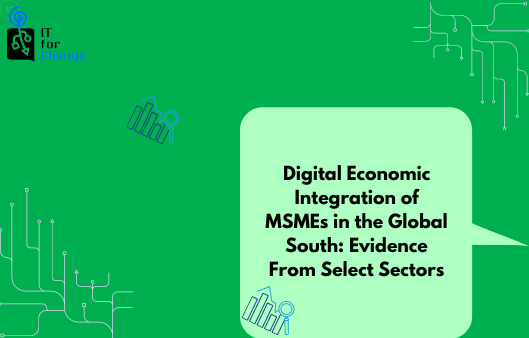In this project, IT for Change, Institute of Development Studies (IDS), and country partners will unpack how micro, small and medium enterprise (MSME) participation in the global economy is increasingly shaped by the rapid deployment of digital technologies (e.g. ERP, RPA, platformized models), as well as the mediating impact of regulatory frameworks around digitalization, data governance, and industrial policy.
The proposed study attempts to make connections between MSME digitalization and the political economy of the digital marketplace and global value chains, in order to frame opportunities and challenges in relation to development outcomes, with a particular focus on the gendered consequences. Going beyond the barriers of gender-based discrimination, and the efficiencies brought about by digitalization strategies, the study intends to delve into emerging policies on global digital trade, international data flows, AI governance, etc., in order to understand how they (re)shape MSME integration into digitalized marketplaces and what implications they may have for the productive capacities of women-led MSMEs.
Details of Study
Research Questions
-
How is MSME digitalization in the Global South playing out?
-
Where are MSMEs based along the data value chain?
-
How do key macroeconomic trends and regional/national/sub-national policies (such as in data governance, e-commerce, and FDI) shape the digital capacities and models of integration of MSMEs?
-
How can national and global policy frameworks enable inclusive and equitable participation of MSMEs in digitalized marketplaces?
Regions
Asia, Africa, and Latin America
Focus Countries
Brazil, Argentina, Kenya, Indonesia, Philippines, Thailand, Cambodia, and India. (A maximum of five countries across the three regions will be chosen for the study.)
Focus Sectors
-
Agro-processing: The digital upgrading of MSMEs in agro-processing value chains is significant to the larger workforce employed in the agricultural sector. Additionally, women workers and entrepreneurs are concentrated in the manufacturing of food products.
-
IT Enabled Services (ITES): Business services value chains are being transformed through digitalization (e.g., automation through chatbots in the BPO sector and data annotation markets for AI development), impacting low-end work and opportunities for MSMEs to enter and upgrade in the market.
-
Tourism: Micro, small and medium-sized tourism enterprises form the backbone of local tourism. As efforts to reboot tourism accelerate worldwide, the ability of small tourism businesses to take advantage of digitization and platformization trends in travel and tourism will be important to their economic recovery.
Research Methodology
This will be an in-depth qualitative exploration of approximately 200 MSMEs across five countries on the parameters outlined above, and the primary data collection methodology will be field visits and interviews with various actors in the MSME ecosystem. In addition, the macroeconomic analysis, including linkages between policy choices and trends at the country level with MSME capacities, as well as a critical examination of the national digital economy/ MSME development strategy will involve secondary research review of select policy documents, apart from interviews with policymakers.
Read the complete concept note here.
Call for Research Partners
The six-eight-month study will be conducted through a hub and spoke model with partner organizations/researchers across Asia, Africa, and Latin America. We are seeking motivated, strong, and committed researchers to be a part of the study. We offer an opportunity to be a part of and learn from a multi-country research team, and shape thinking on national and global policy frameworks that can enable inclusive and equitable participation of MSMEs in digitalized marketplaces.
What is Expected?
Research partners will be expected to undertake deep dives in the chosen countries based on guidance and review from IT for Change and IDS and a prescribed template structure for research.
Research partners will be responsible for:
-
A qualitative analysis of the experiences of 40-50 MSMEs in at least two sectors in one country from the list of countries and sectors indicated above, supplemented by two case studies of women-led MSMEs.
-
A state of play analysis report of macroeconomic trends and national/sub-national policies in relation to the MSME ecosystem in the sectors of study.
-
A final country-level research report integrating the findings from 1 and 2 above, with a clear policy recommendations section, including a focus on women-led MSMEs.
-
Participation in the research ideation and review workshops convened by IT for Change and IDS at regular intervals.
Timeline
The estimated total time commitment required over the study duration will be between 40-50 working days allocated towards the following activities.
-
Five days of workshop participation over the six-eight-month period
-
12-15 days for data collection (Aug-Sept)
-
12-15 days for analysis (Oct-Nov)
-
12-15 days for report writing (Dec-Jan)
Click here to apply.
To download the complete call for applications, click here.

